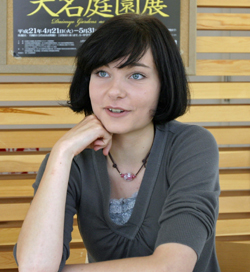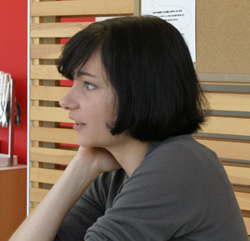
Name: Salla Salmela
Age: 22
Nationality: Finnish
Program: HUSA (Hiroshima University Study Abroad)
Hobbies: Sports, writing, reading, music, movies
Future Dream: Journalist
First Japanese Phrase: Koohii wo kudasai (I’d like a cup of coffee).
Thank you for allowing me to interview you today, Salla. First, why did you choose to come to Japan?
My major at my home institute (University of Jyvaskyla) is journalism, and I hope to specialize in Asia. I’ve also been interested in the Japanese language and culture for years now.
What began your interest in journalism?
My interest started so long ago, I don’t really remember anymore (laughs). But it was the only thing I wanted to do for years now, probably because I’m curious about many different things and I like to meet different people, plus I like to write. So journalism fit all of that.
You mentioned that you’d like to specialize in Asia in particular.
Yes. I’ve been interested in Asia for awhile and I think that by specializing in Asia, since there aren’t very many Asian specialists in Finland, it might open up new doors to me in my career. As for what began my interest in Asia, there’s something really fascinating about the culture - while of course, there is no such thing as “one Asian culture”, but - the culture is exotic, but it’s still somehow very familiar and similar to Finnish culture in some ways.
For example…?
Well, for example, if you compare Finnish people with other Scandinavian peoples, we are more quiet, and not very open with people when we first meet them. It’s difficult to get to know us, but once you do, the friendship lasts. I find that this is very similar to Japanese culture. People are polite, but that doesn’t mean that they’re your friend yet. But once they are, you’re really very close. So that’s one similarity.
Oh wow. So, why did you choose to come to HU?
I’m actually the first one from my university to come. Therefore I couldn’t get any "first hand" information from previous students, but I wanted to try and study abroad someday - and that’s when this new program and opportunity opened up. I applied and I was lucky - I got in (laughs).
Does your university have any other programs with universities in Asia?
As far as I know, they have programs in China, Korea, and Thailand. But since I had previously taken Japanese language classes, I wanted to learn more Japanese, which is why I’m here.
What is Japanese language education like in Finland as compared to here at HU?
When I came to Japan, the way that the Japanese teach language is the teacher will say something and then you repeat it, and then the teacher says something again, and you repeat it, and so on…
But in Finland, it’s more like they ask you a question and you have to answer it, or you have to make-up sentences. I suppose we speak more, like doing work in pairs. Our classes also integrated speaking, reading, listening, and writing into one class. We don’t have separate classes for that like they do here.

How long did you take Japanese before coming to HU?
I look 4 courses since it’s not my major or my minor, so I could only take the courses when I had free time, and if another class overlapped with it, I had to drop it. So my Japanese was really poor. But I feel like my Japanese has gotten better, not just because of my classes, but also just by being here. For example, you start reading and studying kanji (Chinese characters), but in Finland, after your leave the classroom, that’s it, you don’t see kanji anymore. But here, they’re everywhere, so I guess it’s just living here that helps.
I can imagine. Are there any changes you’d like to see in your classes here?
I’d like more integrated classes for Japanese and international students because in my experience, there are very few courses like that here. Plus, once you take those courses, there are very, very few Japanese students, and they tend to drop the class after a few meetings. I’m not too sure why. But overall, I’m pretty happy. I got what I came for (laughs).
Is there anything you found surprising about HU or Japan?
There were lots of surprises, of course, but since I’ve been here since September, many of those surprises have already passed. But there was lots of paperwork and they’re very strict out filling them out. If you do the smallest of things wrong, they just send you the form back to fill out again. That was a bit frustrating in the beginning, but I got used to it. In Finland, we do have bureaucracy, but it’s not as strict as Japan when you make a mistake. But what surprised me most was that it’s much, much easier to live here than I thought.
Is this your first time in Japan or Asia?
No, I hadn’t been to Japan before; I had only been in Thailand for vacation. So you could say that this is my first time to really see Asia. Coming to Japan, I actually found myself seeing similar things to what I saw in Finland, and so I feel like I’m able to see my own culture better.
For example, back home, I’m part of the majority, but here, I’m a minority. Just like Japan, Finland is a very homogeneous country and you can tell pretty easily, when people are not Finnish. We also don’t have many immigrants.
But now that I’m here, I think I better understand how the immigrants back home feel (being a minority). I mean, when I’m in Finland, and I’m Finnish, I don’t really think about what being a minority is like, but thanks to my experience here, I know what to do differently now when I go back home.

Sounds like an eye-opening experience. So speaking of experience, how has your HUSA experience been?
I’ve been pretty happy. When I came here, I already had a flat (dormitory), and the orientation was the day after I arrived, then classes started after that, so it’s been a very safe program. Most everything is done for you, so you don’t have to worry about much.
Anything you feel like you’ve gained by coming on this program?
Lots of self-confidence. I’ve also met lots of people - not only Japanese people, but people from all over the world. The impact they’ve had on me and being able to exchange different viewpoints is huge.
Glad to hear it! Japan is gaining popularity all over the world - which is one reason why we have so many international students here. But what is the image of Japan in Finland like?
Among the younger generation, it’s getting more popular to watch anime or read manga, so young people see Japan for its pop-culture. The older generation sees Japan for its economy or electronics. But since Japan is so far away, it’s very exotic.
How as your image of Japan changed?
Well, now Japan is just…a country among other countries. I’ve bee here, seen normal life…so it’s not that exotic to me anymore. I think I like my current perspective of Japan more than the “dreamy” image I had before I came.
Do you have any advice for the Finnish students who will be coming after you?
Be open-minded because if you’re too shy, then others around you will probably also be shy at first, so you have to be active and make friends. Be open to new viewpoints and take this as an adventure - don’t sweat the small stuff. As long as you’re positive, everything will be good. I did homestays and traveled around Japan, but the main thing is that I talked to different people. If someone asks you to go somewhere, just go and take every opportunity you get.
You’re only here for a year, right? So where have you been in Japan?
Around Hiroshima, Osaka, Kyoto, Kobe, Tokyo… Kobe was really pretty and very easy to get around. But Tokyo is a real metropolitan city, and I like those kinds of places. I don’t feel trapped with lots of people around me, it’s quite the opposite actually. I really liked it there - very lively. I’m a city girl, but every now and again, I really want to go hiking. Maybe because in Finland there are more trees than there are people! If you go to the highest point in the capital, Helsinki, you’ll see lots of forests, even in the center of the city.
Very different from Tokyo. Going back to journalism for a moment, have you had the chance to read any Japanese newspapers?
Not in Japanese, no, but I’ve read the Japan Times and online English-versions, yes.
Do you see any differences or similarities to Finnish journalism?
Well I think Japanese news uses government officials more for their sources. When officials say something, it’s usually recorded word-for-word, but in Finland, the reporter goes to the street and asks the people’s opinions on what officials say. Of course you also see this in Japanese media, but I’m not sure that you see it as much. It’s more news from officials to the people.
What topics interest you in the news?
Well, I suppose general news. I’ve tried working in the entertainment section and entertainment or culture news is nice to do, but, when I’m working on the news, I feel like I do things that are of more importance to the readers. I’ve been working for newspapers in the summertime and right now, I’m writing columns back to a newspaper in Finland which is published around my university about Japan. I write about people I meet, what I hear, and my own thoughts about Japan.
That’s really amazing. I’m sure your readers are looking forward to your next piece. Finally, is there any advice you have for Japanese students or international students?
I notice a lot of Japanese students say they’re not good at English, but when you try and speak it with them, it turns out they’re actually really good. English isn’t my native language, so I make mistakes, but I don’t care about those mistakes, nor do I care if the other person makes mistakes. And I mean, if I try and speak Japanese, I will surely make mistakes, really bad mistakes, but Japanese students have never been mean to me about it so, there’s no need to fear making mistakes. We’re all students and we’re all in a similar place in life, so there’s no need to be afraid. I would look at it as an opportunity. The best time to try and make international friends is right after all the new students arrive because we’re all kind of lost and need new friends, so they’d be really grateful if someone would just say “hi.”
Great advice! Well that concludes our interview today. Thank you so much for talking to me today, and I hope you enjoy the rest of your time here in Japan.
Thank you!
A Word from Our Students!
Hiroshima University is... cozy.
Study Abroad is... an adventure.



 Home
Home